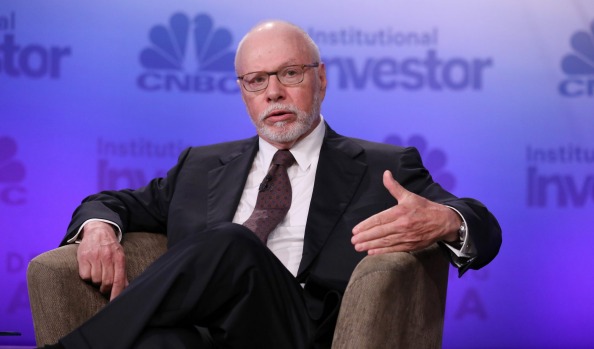From mining to chemicals to generic drugs, billionaire Paul Singer’s investment vehicle Elliott Management Corp. is making its $33 billion presence felt in Europe this week.
On Wednesday, the activist investor said it boosted its holding in the London-traded shares of BHP Billiton Ltd. to 5 percent from 4.1 percent in April, adding pressure on the world’s biggest mining company to enhance returns. Hours later, Elliott and Akzo Nobel NV agreed to end their legal confrontation after the Dutch chemicals and paint giant after months of bickering over strategic direction.
Singer’s firm may also be the key to whether a takeover offer for German generic drug maker Stada Arzneimittel AG — in which it holds an 8.7 percent stake — is successful as a deadline for investors to tender their shares approaches at midnight Frankfurt time.

Elliott is one of the most feared activists taking on companies and sometimes even countries. The investment firm is known for its dramatic wagers, such as leading a group of holdout creditors seeking repayment for positions in Argentine debt. One of Singer’s most recent campaigns — a bid to buy Texas power distributor Oncor Electric Delivery Co. — has pitted him against legendary investor Warren Buffett.
“Paul Singer is old school — a smart, value-based, hard-nosed investor who has staying power,” said Saleem Siddiqi, founder of Musst Investments LLP, which provides capital to hedge funds and isn’t an investor in Elliott. “This allows him to tackle complex situations others may not.”
Since Singer’s fund went public with its push to overhaul BHP in April, the company’s London-traded shares have risen 6.1 percent, compared to a 1.3 percent gain in the FTSE 100 Index. Elliott, which first bought shares in Akzo Nobel in 2016, urged the company to engage in talks with suitor PPG Industries Inc. in March, people familiar with the matter said. Since reports of the shareholder’s discussions, Akzo Nobel shares have gained 2.9 percent. Stada has gained 2.4 percent since people familiar with the matter said Elliott had built a more-than 5 percent stake on July 6.
Singer’s Elliott Associates fund rose 3.5 percent in the first half, according to a letter to investors.
Activists are no longer confined to the U.S. as they look to diversify bets away from a crowded market. Economic uncertainty across the globe is exposing weaker management and pushing shareholders to demand changes.
That’s led them to Europe’s largest companies. Their targets on the continent more than doubled from 2013 to 2016, according to data from researcher Activist Insight. Companies with a market value of more than $10 billion are also the biggest target for activists so far this year, making up 27 percent of the total in the region, the data show.
“Stars are continuing to align in Europe” for activists, said Jim McNally, a partner at law firm Schulte Roth & Zabel LLP specializing in mergers and acquisitions. A good amount of deal activity, which gives activists the chance to agitate for different or improved offers, and companies that have been “sleep walking” are presenting opportunities, he said. “Having seen some of their brethren do well in Europe, U.S. investors are now starting to think and look a bit closer.”
Beyond Elliott’s activities, Keith Meister’s Corvex Management has built stakes in French yogurt maker Danone and Swiss chemical firm Clariant AG this year, working to scuttle the company’s plans to take over rival Huntsman Corp. Also in Switzerland, Daniel Loeb’s Third Point revealed a $3.5 billion stake in Nestle SA, his biggest-ever bet.
Activist investors seeking quick returns and fast turnarounds of transformation plans face the possible resistance of corporate boards in Europe still built around a consensual model. In Germany, in particular, worker representatives are a powerful component of the supervisory panel that signs off on key strategic steps, often complicating drastic moves like large asset disposals or company splits.
German labor union IG BCE has warned that if Bain Capital and Cinven fail to win backing for their second attempt to take over Stada on Wednesday, it will “vehemently object to any new offer and won’t accept another year of uncertainty” for workers.
Agitating for change at companies is becoming an increasingly popular way for hedge funds to squeeze out gains as low-interest rates hurt returns. Money managers specializing in such tactics have clocked more than double the gains of average peers over the past five years, according to data compiled by Hedge Fund Research Inc.
Industries such as consumer, industrials and the materials sector are most exposed to activist shareholders, consultancy Alvarez & Marsal Inc. said last month. Typical activist targets are companies that have suffered declines in share price, return on equity, earnings or cash generation, or those with rising expenses, the restructuring firm said.
“Elliott is the standard bearer for activism in Europe importing the tactics we have seen from the U.S.,” said Christopher Sullivan, a partner and M&A specialist at law firm Clifford Chance in London. “We expect that others will seek to replicate the approach and boards must be prepared.”







